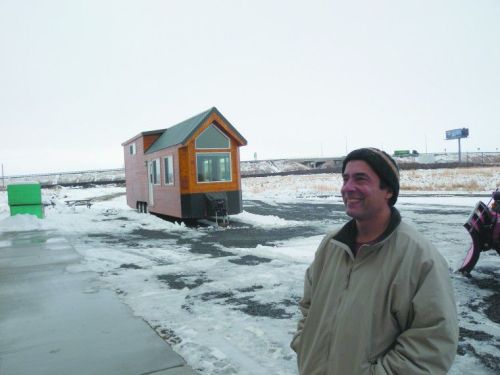A subdivision for tough times: tiny homes
Published 6:34 am Sunday, December 19, 2010

- Rich Daniels stands in front of a half-pint in North Powder in Eastern Oregon. Daniels, 50, has come up with an idea that may prove both brilliant and quixotic: a subdivision for 50 to 100 pint-size homes geared to folks hurt by the real estate bust, jobless or on fixed incomes. Increasingly, he's approached by people desperate to cut their living expenses.
NORTH POWDER Ex-logger and gold miner Rich Daniels was making his living building storage sheds when his customers began commenting, If this shed was bigger, I could live in it. That got Daniels to thinking.
So I made a cabin on wheels, he said. Hes built and sold more than 100 minimalist homes some that can be towed behind a pickup during the past five years.
Trending
Now the 50-year-old builder has come up with an idea that may prove both brilliant and quixotic: a subdivision for 50 to 100 pint-size homes geared to folks hurt by the real estate bust, jobless or on fixed incomes. Increasingly, hes approached by people desperate to cut their living expenses, he said.
Its obvious they are looking for a cheap place to live while they get back on their feet, Daniels said. There are a lot of people getting kicked out of their 2,000- and 3,000-square-foot homes. Where are they gonna go?
While some may be ready to simplify and live smaller, the trick will be to weave that idea through Oregons land-use laws.
The subdivision location Daniels has in mind is a former Idaho Timber Co. sawmill log yard southeast of North Powder, population less than 500. Its between La Grande and Baker City.
Part is zoned exclusive farm use and the rest is industrial and neither allows for a subdivision, said Union County planner Hanley Jenkins of La Grande. Winning county approval is likely to be impossible, he said.
Still, it might have a chance if North Powder annexed the spot into the city and extended water and sewer lines there, Jenkins said.
Trending
North Powder Mayor Bonita Hebert said thats a possibility because utility lines already reach to the edge of the property. But the city would have to change an ordinance that requires dwellings to be at least 900 square feet, she said.
They are just beautiful, well-built, the mayor said of the cabins. They would be very comfortable for a couple to live in.
For the past five years, Daniels has built 20 rustic cabins a year, some as small as 144 square feet. The biggest are 400 square feet or with a loft, 800 square feet. Costs so far have ranged from $15,000 to $95,000.
Its his second new profession since the shrinking wood products industry pushed him out of his job as a U.S. Forest Service contract timber cruiser. He bought a small sawmill and built and sold utility sheds, using lumber milled on his property. And that gave way to Richs Portable Cabins. He still operates the sawmill and occasionally builds a shed, but seldom uses milled timber from his own property these days.
Daniels customers sometimes request such off-the-grid options as solar panels, banks of electrical storage batteries, holding tanks, wood-burning fireplaces and propane-powered forced-air stoves, water heaters and refrigerators.
Hes promoting the idea of placing some of his cabins along the circular, 870-mile Blue Mountain Heritage Trail, a European-style bed-to-bed hiking and horse trail under development as a tourism draw. The trail is the brainchild of 84-year-old Loren Hughes of La Grande, and the design calls for meals and beds to await hikers at the end of each days trekking, so they need carry nothing but day packs.
But his boldest idea is the North Powder subdivision.
Daniels owns about 50 acres on the edge of North Powder and proposes developing it like an RV park, but with residents committed to downsizing to save money. They would buy and own the cabins and he would retain ownership of the land.
The biggest problem with the whole (tiny home) movement is the counties and cities are having a hard time accepting these small homes, Daniels said. It has to do with revenue small homes dont generate the tax revenues for the counties and cities.
Still, tiny cabins make up an increasingly large segment of vacation homes in many RV parks along the Oregon coast, notably around Gold Beach and Brookings in southwestern Oregon, said Grant Young, spokesman for the Oregon Land Conservation and Development Department.
Miniature homes under 400 square feet are classified as park model recreational vehicles, said David Pratt, the Curry County planning director. Hes seen some half-pint homes in his area advertised for as much as $100,000 and said some RV park owners in his county rent them to visitors.
Jenkins, the Union County planner, thinks Oregon land-use laws will put the brakes on several uses people make of the new breed of tiny, wheeled cabins in rural Oregon. For example, siting a self-contained cabin without utilities on a tract too small for a dwelling is illegal under state land-use regulations, he said. A minimum 240 acres generally is needed for a dwelling in a timber-grazing zone and 320 acres is needed on rangeland, he said.
As for using a cabin as a spare guest bedroom, that, too, is a violation because a cabin then constitutes an individual dwelling, even if its cute, hand-crafted and on wheels, he said.
Oregon land-use laws say you have to get land-use approval for a dwelling, and buyers of cabins on wheels need to make sure they have a legal place to put one before they buy, he said.
Tomm and Kathy Freeman of Coulee City, Wash., commissioned Daniels to build a 396-square-foot, $95,000 dream retirement home complete with a loft, lots of built-in cabinets and a porch. Its in a private, 1,500-unit RV park.
Its terrific, it is a great size, said the 62-year-old Freeman, a retired Boeing employee from Seattle. At 5-feet-8, he cant quite stand upright in the loft. Nevertheless, its a lot more space than it sounds like. It has an extra bedroom up there and a small office, he said.
Freeman sometimes finds himself looking wistfully at somebodys 6,000-square-foot trophy home. And then I think of how much Id have to pay to heat it, he said with a laugh.









